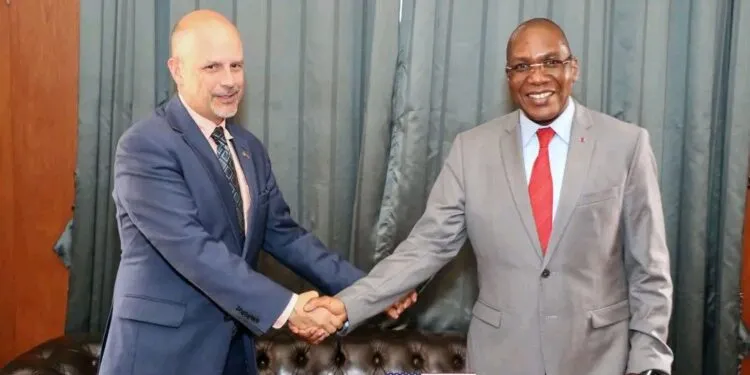Over decades, the United States of America has pumped in billions of FCFA to Cameroon to combat HIV/AIDS, hunger, and other diseases, as well as support youth entrepreneurship. These billions have significantly impacted lives across the 10 regions of Cameroon. For hundreds of thousands of patients that rely on this funding, the cost of treatment this time might be a challenge to them.
That’s because the new US president, Donald Trump, has frozen all funding in health and other sectors to countries except Israel and Egypt.
Cameroon to Achieve HIV Epidemic Control by 2030
During the 20th anniversary of the US Centre for Disease Control presence in Cameroon last September 10, the US Ambassador to Cameroon, Christopher Lamora, said Cameroon was on track to achieve HIV epidemic control by 2030, potentially becoming the first country in the West and Central Africa region to attain this laudable status.
That was because through the United States Global Health Security Agenda, the US Centre for Disease Control has provided expertise and support to build Cameroon’s public health capacities in workforce development, disease surveillance, emergency management, and laboratories.
“As I said at the launch of the National Paediatric HIV Surge in April, achieving this goal before 2030 is not just aspirational but a realistic ambition powered by Cameroonians’ unwavering determination.” Lamora said, “The United States has been proud to fund the Cameroon Population-based HIV Impact Assessments, or CAMPHIAs, over the years through our PEPFAR program to measure the prevalence of HIV and inform our response on the road to epidemic control.”
The program, according to Lamora, was CAMPHIA 2024, which is now underway, will test nearly 30,000 people across all 10 regions and help illuminate next steps.
Those initiatives represented just a few of the activities the US was doing in Cameroon.
CDC Invest over 400 billion FCFA
Only in the domain of health, the CDC in over 20 years has established its office in Cameroon, investing nearly 400 billion francs CFA toward public health.
According to the US ambassador, Cameroon was making good use of the funding as it was helping the beneficiaries.
The ambassador has signalled the continuation of the funding properly without foreseeing a change in policy.
And Cameroon has delivered! I am confident we will continue to surpass expectations in the coming years.
“The U.S. Mission in Cameroon looks forward to continued collaboration to advance the health of people in Cameroon.” He said.
Implications of Halting Funding
In August last year, Cameroon launched the Cameroon Population-based HIV Impact Assessment (CAMPHIA) 2024 in partnership with the U.S. government, specifically the U.S. Centres for Disease Control and Prevention (CDC) through the U.S. President’s Emergency Plan for AIDS Relief (PEPFAR).
Through that, CAMPHIA 2024 was going to collect demographic and epidemiologic data among people 15 years of age and older from all ten regions of the country to evaluate the impact of the HIV epidemic response in Cameroon.
During that launch, Ambassador Christopher Lamora said the United States government was “proud to have funded the Cameroon Population-based HIV Impact Assessment 2024 through our PEPFAR program. CAMPHIA 2024 will provide gold-standard data that public health experts can then use to evaluate what works and what doesn’t and to guide the next phase of the fight.”
This CAMPHIA in between 2017-2018, revealed that among the estimated 500,000 people living with HIV in the nation, only 56% were aware of their HIV-positive status.
In 2024, it was going to provide much-needed up-to-date information based on biological data to guide efforts to reach the last mile.
The US said over 70% of the $19,000,000 (over 11.9 billion FCFA) implementation funding was channelled to the Cameroon Baptist Convention Health Board.
“Cameroon has made incredible progress in its national HIV response. In fact, the nation is on track to reach HIV epidemic control among adults and end AIDS as a public health threat by 2030,” said CDC Country Director Dr. Mohamed F. Jalloh last year.
New Challenges
Now without funding, it is going to be increasingly challenging for Cameroon to render some of those services.
Cameroon this year allocated 297.2 billion FCFA for health. But that money might likely be insufficient considering that the US CDC used to supplement with huge chunks of billions some of the health priorities under the ministry.
Over the years, CDC/Cameroon has contributed to saving thousands of lives—an achievement accomplished only because of our partnerships.
However, the US was not giving all the money directly to the government but through NGOs and health facilities and through training.


